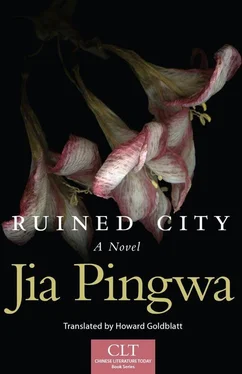“Would you look at that old cow. What a stupid animal!”
The cow was not upset; she snorted, laughing at the man. They don’t understand that the wisest men often appear to be dimwitted. Seeing that the cow was not angered by the comment, the passerby walked up and poked her in the rump with a broken branch and slapped her on the ear. “See, she doesn’t dare move,” he said.
She opened her eyes and stopped. Frightened by the motionless cow, the man said, “Watch your cow, lady.” At that moment, she wished she could storm into every house in one night and assault the city’s women to invest the human race with strength and a wilder nature. The cow did have that urge one day, when an old man turned on his radio to listen to Journey to the West , the tale of a monk who retrieves the sacred Buddhist texts and fights demons with the help of Monkey, Pigsy, Sandy, and their White Horse. Convinced that modern people can only enjoy the spectacle, not the classical author’s meaning, the cow wanted to shout: It’s not about a master and his four disciples, but about the idea that only through their combined effort can nature be conquered and the sutras obtained. But what can humans do now that they no longer have Buddhism in their hearts and have lost the spirit of the monkey, pig, and horse?
. . .
Zhuang Zhidie had a free day, so he put the finishing touches on a series of magic realist fiction he had recently completed and sent it off to a newspaper, before heading off to the editorial section of Xijing Magazine . He had yet to learn of Zhong Weixian’s reaction after receiving a letter from Suzhou, and was worried that he might have seen through the ruse. He walked in and saw three desks pushed together for the editors to eat a Western-style buffet lunch.
“This is an example of ‘Heaven invites when man will not.’ We’re celebrating a victory today and have agreed not to invite any outsiders, but then you show up. So we’ll just have to eat less,” Li Hongwen said when he saw Zhuang.
Zhou Min got a chair for him. “They said we ought to celebrate with a lunch,” Zhong Weixian said. “I’m fine with that, but then they wanted Western food and had to eat it in the building. So we ordered this from the Xijing Hotel. Now that you’re here, we must all share in hardship and in good fortune. Everyone, let’s toast our writer.”
Zhuang downed his first glass. “I got you all in trouble, and it was through concerted efforts that we are here today, so I’d like to say thank you.”
“I was the one who got the magazine in trouble,” said Zhou Min, “and got Zhuang Laoshi involved. I want to apologize to everyone.”
“No need for apologies or thanks. If anything, we ought to thank the deputy governor in charge of cultural affairs,” Li said, and they had another toast to that.
After lunch, Li collected the plastic containers, intending to string them together and then hang them out the window. Zhong Weixian did not like that idea, considering it unsightly, but Li said he wanted it to be harsh on the eyes of Jing Xueyin and Wu Kun. In his view, they were being magnanimous by not setting off firecrackers and flashing slogans.
“What did the other side say about not printing the announcement?” Zhuang whispered to Zhong, who was sitting beside him.
“She raised hell in the department head’s office, and Wu Kun pressured the higher-ups, claiming that she could not explain herself to her husband. They said she had always been the dominant member of the family, but now he could hold this over her head and had become a brute, making life so hard on her that she tried to take her own life several times. Who believes that nonsense? No one. Li Hongwen even said he saw Jing and her husband shopping at a mall arm in arm.”
“Do you really trust Li to tell the truth?” Zhuang asked.
“Even if we don’t,” Zhong said, “she wouldn’t consider suicide; she’s not the type. It’s all because of that meddling Wu Kun, who’s using Jing to attack me. She doesn’t understand that.”
Zhuang said nothing in response. Then Gou Dahai came in with a pile of magazines, newspapers, and letters.
“Is there a letter for me?” Zhong got up.
“No,” Gou said.
“No?” Zhong sat back down. “Maybe one’s stuck in between.” He flipped through the mail but found nothing. Then Gou took a letter from his pocket.
“I knew you’d ask about letters,” he said. “You owe me a meal. If you say no, I’ll open this in front of everyone.”
“Don’t do that,” Zhong said with a red face. “I treated you last time. Do you really expect me to do it again? How many people am I going to have to feed the next time I get a letter?” He reached out, grabbed the letter, and shoved it into his pocket.
“What’s so important about that letter?” Zhuang asked.
“They’re just having fun with an old man,” Zhong said. “A letter from a friend.”
“Come tell us when you’ll send us one of your manuscripts, Zhidie,” Li said. “Mr. Zhong has to go to the toilet now.” That got a laugh out of everyone but Zhuang, who was confused. “Going to the toilet right after lunch? It looks like the import and export firms are right next to each other.”
“He’s going to read the letter!” Li said. “He went to the toilet when the last letter arrived, and stayed there so long I thought he’d passed out from holding it in. So I walked over to take a look. The door was shut and he was inside crying.”
Zhong was too embarrassed to stay, so he went with Zhuang into the hallway. They chatted for a while. Noticing that Zhong did not invite him to his office and that he kept touching his pocket, Zhuang knew that he was eager to read the letter, so he left. When he turned the corner in the hallway and spotted a toilet, he went in. He shut the door of the stall, and saw that it was crammed with graffiti and drawings, not much different from other toilets all over China, except for one phrase: “Class A cultural relic for preservation — the site where Zhong Weixian reads letters and sheds tears.” Zhuang felt like laughing, but a sense of sadness made him pull up his pants and walk out.
When he returned to the federation compound, he saw that Liu Yue had not come to cook for him. He sat down to write another letter for Zhong. After he finished it, he thought about how the letter was a fake, and yet Zhong treasured it so. An old man like that could not forget the love of his youth. What about him? He and Jing Xueyin had once been so close, and now they were mortal enemies. A loathing for Zhou Min rose up inside when he recalled how happy he had been at the lunch celebration. He wondered how Jing felt at that moment. Wu Kun had said she wanted to take her own life, which was unlikely, but it was inevitable that she would be having trouble at home. Feeling sorry for he, he decided to write her a letter, but he tore it up halfway through and started another one, this time to Jing and her husband. He told them he hadn’t read Zhou’s article and would not have approved it if he had, adding that the author was simply inexperienced and had no intention to slander. Zhuang hoped they would believe and forgive him. He finished the letter by stressing that he would never forget the care and concern she had shown him in the past. Now he could only apologize again for the problems it had caused her and her family. What he could do was insist that there had been nothing romantic in their relationship. He felt calmer after writing the letter. He lit a cigarette and played the funereal music tape that Liu Yue had brought over for him. Later, when dusk arrived with its red sunset, he walked out with the two letters, planning to give Zhong’s letter to Ah-lan the next morning. But he was confused and posted both letters. Standing at the mailbox, he could have kicked himself over his relationship with Jing Xueyin. He had been naïve, too self-deprecating and timid. What would things be like now if back then he had been the way he was today? Thumping himself in the chest, he wondered if he had acted correctly. Suddenly feeling nauseous, he threw up loudly, making passersby cover their noses. He looked up and saw someone with an urban sanitation monitor armband eyeing him with a summons book in hand. Zhuang was so mad he went over to a sewer drain, but he couldn’t bring up anything more.
Читать дальше


![Matthew Vincent - [you] Ruined It for Everyone!](/books/216429/matthew-vincent-you-ruined-it-for-everyone-thumb.webp)









